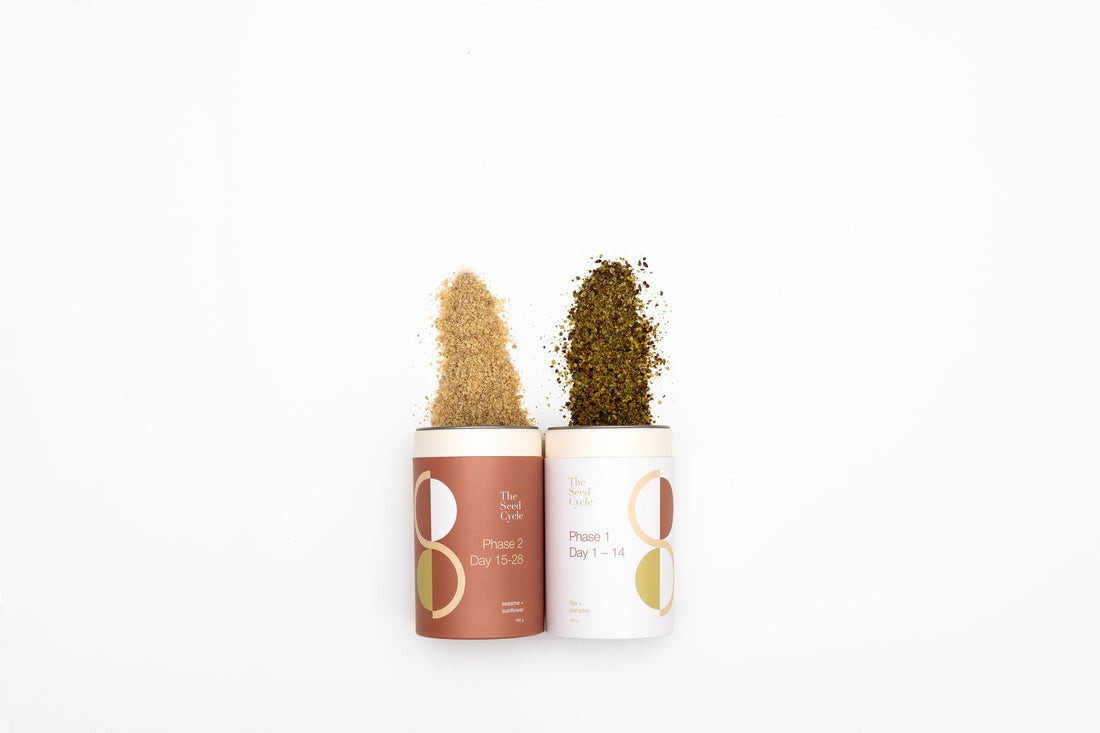In today's modern world, where exposure to Endocrine-Disrupting Chemicals (EDCs) is a reality, taking proactive steps to support our hormonal health is essential. EDCs can disrupt our delicate hormonal balance, leading to a range of health issues. In this context, seed cycling emerges as a powerful and natural preventative measure.
By incorporating seed cycling into our routine, we can potentially mitigate the effects of EDCs and promote hormone balance. The specific seeds used in seed cycling, including pumpkin, flax, sesame, and sunflower seeds, contain nutrients that support estrogen and progesterone production, helping to counteract the disruptions caused by EDCs.
In this blog post, we'll explore what EDCs are, how they affect our hormone levels, potential health consequences, and practical steps to reduce exposure. Additionally, we'll delve into the benefits of seed cycling and the changes you may notice in your hormonal health when implementing this natural practice.
Understanding EDCs and their Impact:
EDCs are synthetic or naturally occurring chemicals that can interfere with the body's endocrine system, disrupting hormone production, regulation, and function. Common hormone disrupters in our modern world include phthalates (found in plastics and personal care products), bisphenol A (BPA) (used in food containers and receipts), pesticides, and certain heavy metals.
The Effects of EDC Exposure:
Exposure to EDCs can have detrimental effects on our hormone levels and overall health. These chemicals can mimic or block hormones, leading to imbalances and various health consequences. Potential long-term effects of EDC exposure include reproductive disorders, disrupted menstrual cycles, infertility, increased risk of certain cancers, metabolic disturbances, and compromised immune function. Practical Steps to Reduce EDC Exposure and Support Hormone Health:- Choose natural and organic products: opt for organic foods, natural personal care products, and household items to reduce exposure to pesticides and synthetic chemicals.
- Avoid plastic containers: Minimise use of plastic containers for food and beverages, especially those labeled with recycling codes 3, 6, and 7, as they often contain harmful chemicals.
- Filter your water: Use a water filter to remove contaminants such as chlorine, heavy metals, and pesticides that may be present in tap water.
- Go for non-toxic cleaning products: Replace conventional cleaning products with natural alternatives or make your own using simple ingredients like vinegar, baking soda, and essential oils.
- Eat a balanced diet: Focus on whole foods, including plenty of fruits, vegetables, lean proteins, and healthy fats, to support overall health and hormone balance.
- Seed cycling: Acts as a supportive practice, nourishing our bodies and potentially mitigating the impact of EDCs, making it a valuable strategy for everyone seeking to maintain hormonal well-being in our modern world.
Seed Cycling and Hormonal Health:
Seed cycling is a natural technique that involves consuming specific seeds during different phases of the menstrual cycle to support hormonal balance. By incorporating pumpkin and flax seeds during the follicular phase and sesame and sunflower seeds during the luteal phase, seed cycling aims to optimise estrogen and progesterone levels.
Learn how to start seed cycling here. When beginning seed cycling, you may notice several changes in your hormonal health over time, including more regular menstrual cycles, reduced PMS symptoms (such as bloating and mood swings), improved energy levels, and clearer skin. It's important to note that individual experiences may vary, and it may take a few cycles to observe significant improvements.
Understanding the impact of EDCs on our hormonal health is crucial in our journey towards overall well-being. By taking practical steps to reduce EDC exposure and support our hormone health, we can make positive changes in our lives. Additionally, seed cycling offers a natural approach to hormone balance, allowing us to tap into the potential benefits of specific seeds during different phases of our menstrual cycle.
Remember, always consult with a healthcare professional or a qualified practitioner to determine the best approach for your specific needs. Let's prioritise our hormone health and embrace the power of natural solutions for a vibrant and balanced life.

Watch the Instagram LIVE: Hormone Health 101: From EDCs to Seeds ?Watch the Instagram Live with Mel, founder of The Seed Cycle, and special guest Natasha Godfrey, Women's Health Naturopath (BHSC).In this session, we diving deep into the world of hormone health, exploring everything from EDCs to the power of seed cycling.
Natasha is an expert in functional naturopathic medicine and dietetics, with a passion for helping women connect back to their bodies and their cycle through natural remedies and food as medicine. Discover how you can support your hormone health with simple, natural strategies. You can watch it here.
References:
Hormone Disruptors:- Vandenberg, L. N., et al. (2012). Hormones and endocrine-disrupting chemicals: Low-dose effects and nonmonotonic dose responses. Endocrine Reviews, 33(3), 378-455.
- Gore, A. C., et al. (2015). EDC-2: The Endocrine Society's second scientific statement on endocrine-disrupting chemicals. Endocrine Reviews, 36(6), E1-E150.
- Brighten, J. (2021). Beyond the Pill: A 30-Day Program to Balance Your Hormones, Reclaim Your Body, and Reverse the Dangerous Side Effects of the Birth Control Pill.
- Brighten, J. (2019). Seed Cycling for Hormonal Balance. Retrieved from https://drbrighten.com/seed-cycling-menopausal-hormones/

